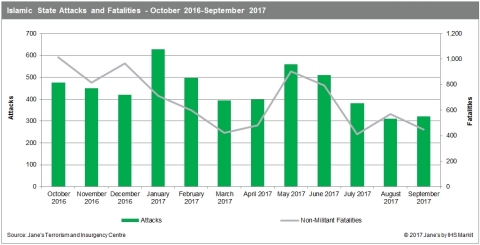Territorial Destruction of the Islamic State Will Not End Ongoing Threat, Says New Report from Jane’s by IHS Markit
The imminent territorial destruction of the Islamic State will not end the group’s pervasive ongoing threat, both locally and internationally, according to a report released today from Jane’s by IHS Markit (Nasdaq: INFO), a world leader in critical information, analytics and solutions.
This press release features multimedia. View the full release here: http://www.businesswire.com/news/home/20171117005243/en/

Islamic State Attacks and Fatalities - October 2016 - September 2017 (Source: Jane's Terrorism and Insurgency Centre)
With the recent losses of Deir al-Zour and al-Bukamal in Syria and al-Qaim in Iraq, alongside the final offensive targeting Rawa, the Islamic State will likely cease to be a territorial entity in Iraq and Syria by the end of this month.
“Despite the hope - or perhaps misguided expectation - otherwise, the defeat of the Islamic State as a territorial entity will not represent its defeat as a non-state armed group, nor put a halt to its armed campaign,” said Matt Henman, head of Jane’s Terrorism and Insurgency Centre (JTIC). “Instead, the group will almost certainly transition from a pseudo state back to an underground armed insurgency, remaining capable of conducting asymmetric attacks against security forces in Iraq and Syria and continuing to undermine security and central governance.”
Indeed, this process has been underway for the past 12 months at least, as underlined by data recorded by JTIC. Between October 2016 and September 2017, the Islamic State conducted 5,349 attacks worldwide, resulting in a total of 8,139 non-militant fatalities. This represented an interesting change from the preceding 12 months, comprising a 38.3 percent increase in attacks but a 21.8 percent decrease in non-militant fatalities. The fact that the Islamic State has been conducting more attacks but causing fewer fatalities is indicative of the group’s transition to asymmetric insurgent operations in areas of Iraq and Syria that have been recaptured from it by state or non-state adversaries. These operational methods mirror the tactics employed by the group’s affiliates in other parts of the world as the Islamic State strives to build the conditions for establishing territorial control.
A shadow state
The Islamic State will seek to maintain some semblance of its former governance structure as a shadow state, imposing summary justice through abductions and executions, and portraying itself as exercising power in areas under government control.
“The continuation of a shadow state campaign is paramount for the Islamic State’s future ambitions, which remain tied to the establishment of a lasting and expanding territorial caliphate,” Henman said. “The group has portrayed its losses of territory as part of a drawn-out long-term battle against crusading, apostate forces, and it will aim to retain the capabilities to reorganize a wider campaign in the future to regain the territories that it has lost as well as expand its borders further.”
Conflict enters a new stage
While the imminent territorial destruction of the Islamic State is an important stage in the ongoing fight against the group, it will mark a new phase of the conflict rather than its terminus, the report says.
“The denial of a territorial base for the group from which it can impose its fundamentalist interpretation of Islam on a captive population, stage further territorial expansions, and inspire, facilitate, and conduct operations worldwide has justifiably been the pre-eminent focus of the various ongoing campaigns against the Islamic State. But it is of vital importance that the momentum achieved is not squandered by mistakenly assuming that the threat posed by the group has ended,” Henman said.
Focus must turn to counter-insurgency efforts to further degrade the capabilities of the Islamic State while concurrently addressing the political and socio-economic conditions in which the group has thrived and contrived to generate a degree of popular support, at least initially.
New conflicts likely to emerge
“There is a very real danger that the territorial defeat of the Islamic State will precipitate the emergence of new conflicts and crises among its multiple adversaries, both in Iraq and Syria, which will further generate insecurity and instability and thereby recreate conditions that the group will exploit and exacerbate to facilitate a territorial re-emergence,” Henman said.
There has already been a key example of this in Iraq, where the seizure of the city of Kirkuk from Kurdish forces by the security forces was undertaken while the Islamic State still retained critical territory in Anbar province on the border with Syria. Similarly, in Syria the future status of the Islamic State’s former capital of Raqqa encapsulates the potential for violence between pro-government forces and Kurdish forces in the vacuum left by the Islamic State’s defeat.
“Without a concentrated and comprehensive ongoing approach to tackling the Islamic State, both directly in its primary operational areas and its indirect influence in the West, there is every chance that the territorial campaigns against the group currently being concluded will have to be refought in the future,” Henman said.
About IHS Markit (www.ihsmarkit.com)
IHS Markit (Nasdaq: INFO) is a world leader in critical information, analytics and solutions for the major industries and markets that drive economies worldwide. The company delivers next-generation information, analytics and solutions to customers in business, finance and government, improving their operational efficiency and providing deep insights that lead to well-informed, confident decisions. IHS Markit has more than 50,000 key business and government customers, including 85 percent of the Fortune Global 500 and the world’s leading financial institutions. Headquartered in London, IHS Markit is committed to sustainable, profitable growth.
IHS Markit is a registered trademark of IHS Markit Ltd and/or its affiliates. All other company and product names may be trademarks of their respective owners © 2017 IHS Markit Ltd. All rights reserved.
About Jane’s Terrorism and Insurgency Centre (JTIC)
Jane’s Terrorism and Insurgency Centre (JTIC) by IHS Markit uses open source data to build its global database of both attacks by non-state armed groups, in addition to counter-terrorism operations and key statements by state and non-state actors. The database enables users to search by location, target, group (active and dormant), tactics and casualty numbers in order to quickly obtain actionable intelligence and/or data. The database includes over 250,000 events since 2009 and tracks over 1,000 separate non-state armed groups worldwide.
Get in touch here to learn more about JTIC and other solutions from Jane’s.
View source version on businesswire.com: http://www.businesswire.com/news/home/20171117005243/en/






